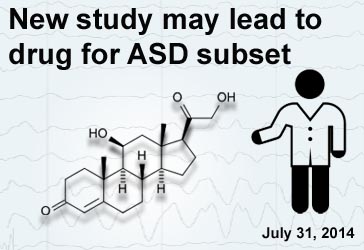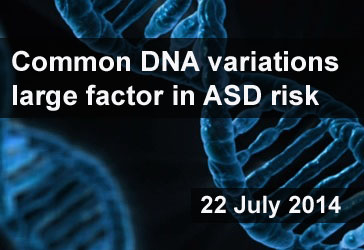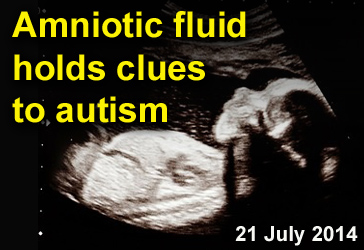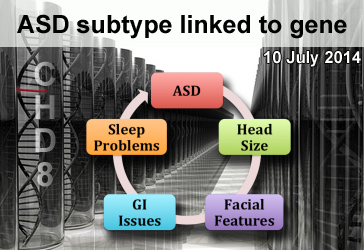Archives
July, 2014
Select a different month in the archive
Study Finds Promise for Steroids in Regressive Autism
By Shana R. Spindler, PhD on July 31, 2014

Background: About a third of children with Autism Spectrum Disorder (ASD) experience a period of normal early development followed by loss of previously acquired language and social skills. While no evidence-based treatments exist for this type of regressive autism (R-ASD), some doctors have reported that corticosteroid use improves language and behavior scores. Corticosteroids are chemicals that mimic hormones naturally produced by the body. They act by suppressing inflammation and the immune system.
What’s new: From a large database of patients, researchers identified twenty children who had received steroid treatments to investigate if corticosteroids benefit children with R-ASD. Twenty four non-treated ASD children were used for comparison. Their study found that children with R-ASD who had received corticosteroids showed greater improvement in language and social skills than those who did not receive steroid treatment. The researchers also found that corticosteroids increased activity in an area of the brain known for auditory processing and the perception of emotions.
Why it’s important: While this study was a small retrospective (the researchers used data from previously acquired measurements), it indicates a need for a larger controlled study of corticosteroid treatment for R-ASD with appropriate controls. The most common adverse effects from corticosteroids in this study included weight gain and difficulty in managing the child’s behavior.
Help me understand :
| Source(s) : |
| Tweet |
Common DNA Variations May Be Largest Factor in Autism
By Shana R. Spindler, Ph.D. on July 22, 2014

Background: The list of autism-associated genes has grown dramatically as researchers identify more and more genetic risk factors. But are these autism-linked genetic variations more often inherited from parents or formed de novo in the child?
What's new: Common, inherited variations in DNA may be the largest cause of autism, according to a new study published in Nature Genetics. According to the researchers, a little over 50 percent of autism cases are from a combination of widespread genetic variations, which alone do not lead to autism, passed from parents to a child. In contrast, new DNA mutations in the child only account for 2.6 percent of autism cases.
Why it's important: This study highlights the complexity of common genetic variations underlying autism.
Help me understand :
| Source(s) : |
| Tweet |
Elevated Womb Hormone Levels Linked to ASD
By Chelsea E. Toledo, M.A. on July 21, 2014

Background: Autism Spectrum Disorder (ASD) is usually detected in young children experiencing atypical development in the areas of communication, behavior, and social interaction. ASD is four times more common in boys than in girls. Researchers have long suspected that sex-related genetic factors may play a role in this disorder.
What’s new: On June 3, 2014, the journal Molecular Psychiatry published a study evaluating a possible link between ASD and the precursors to the male sex hormone testosterone in the amniotic fluid surrounding a developing fetus. The researchers analyzed amniotic fluid from mothers of boys born between 1993 and 1999 in a Danish cohort. In the samples from the 128 boys who later received an ASD diagnosis, the researchers found higher levels of male hormones–as well as a protein known to control hormone activity–than in the samples from the 217 controls.
Why it’s important: Using more than 19,000 amniotic fluid samples, scientists have shown a provocative link betweenelevated levels of steroid hormone and exposure in the womb to later development of ASD. However, further research is needed using different population samples to establish this link for any future clinical application.
Help me understand :
| Source(s) : |
| Tweet |
Strong Evidence for a Genetic Link to Autism
By Sharmila Banerjee-Basu, Ph.D. on July 10, 2014

Background: The genetic landscape of Autism Spectrum Disorder (ASD) is complex. Diverse types of DNA variation—from rare mutations with large effects to common variations with small effects—are thought to contribute to the development of the disorder. Many autism-associated mutations are known, but how each one contributes to autism is not well established.
What’s new: A new study published online in the scientific journal Cell shows convincing evidence that the gene CHD8 is linked to a subtype of autism. Researchers identified eight new CHD8 mutations in 3,730 individuals with developmental delay or ASD. In contrast, the team failed to find similar CHD8 mutations in 8,792 control individuals. Including ASD individuals carrying CHD8 mutations from previous studies, the researchers further examined detailed clinical characteristics in a total of 15 individuals with CHD8 mutations. In addition to ASD, CHD8 mutation carriers have many common features, including significantly increased head size, distinct facial features, gastrointestinal (GI) issues, and sleep problems.
Why it’s important: With rapid advances in genomic technologies, a field of study is emerging where sub-types of autism can be recognized based on mutations in specific genes. Importantly, 13 out of 15 individuals with CHD8 mutations in this study had a diagnosis of ASD, indicating a strong link between CHD8 disruption and ASD onset. One can hope that genetic testing may aid in the diagnosis and treatment decision making in autism in the near future.
Help me understand :
| Source(s) : |
| Tweet |

